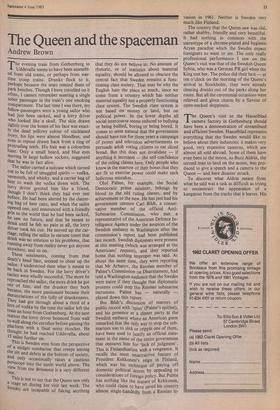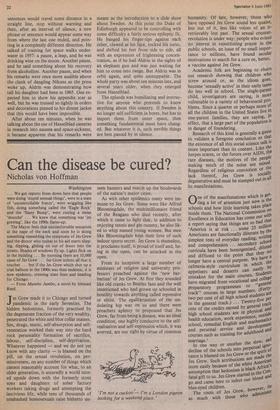The Queen and the spaceman
Andrew Brown
The evening train from Gothenburg to Uddevalla seems to have been assembl- ed from old trams, or perhaps from war- time troop trains. Drunks flock to it, perhaps because the seats remind them of park benches. Though I have travelled on it often, I cannot remember meeting a single sober passenger in the train's one smoking compartment. The last time I was there, my fellow-passengers were a young sailor who had just been sacked, and a lorry driver who looked like a skull. The skin drawn tightly over the bones of his face was exact- ly the dead yellowy colour of uncleaned ivory, his lips were almost bloodless, and even in repose drawn back from a ring of protruding teeth. His hair was a colourless haze. Only a small beard, and blue eyes moving in large hollow sockets, suggested that he was in fact alive.
The sailor carried a suitcase which turned out to be full of smuggled spirits — vodka, vermouth, and whisky, and a carrier bag of beer to wash the vodka down with. The lorry driver greeted him like a friend, though I don't think they had ever met before. He had been alerted by the clatter- ing bag of beer cans, and when the sailor opened one, and announced with a friendly grin to the world that he had been sacked, he saw no future, and that he meant to drink until he felt no pain at all, the lorry driver took his cue. He moved up the car- riage, telling the sailor in earnest tones that drink was no solution to his problems, that running away from reality never got anyone anywhere, and so on.
These sentiments, coming from that death's head face, seemed to cheer up the sailor. I understood then what it meant to be back in Sweden. For the lorry driver's tactics were wholly successful. The more he reproached the sailor, the more drink he got out of him, and the drunker they both became, the more passionate became their denunciations of the folly of drunkenness. They had got through about a third of a litre of vodka by the time the sailor left the train an hour from Gothenburg. At the next station the lorry driver bounced from wall to wall along the corrdior before gaining the platform with a final noisy ricochet. He thought he had reached Uddevalla, about 15 miles further on.
This is Sweden seen from the perspective of a midget sumbarine that creeps among the silt and debris at the bottom of society, and only occasionally raises a cautious periscope into the sunlit world above. The
view from the Britannia is a very different One
This is not to say that the Queen saw only a stage set during her visit last week. The Swedes are incapable of faking anything that they do not believe in. No amount of rhetoric, or of statistics about material equality, should be allowed to obscure the central fact that Sweden remains a func- tioning class society. That may be why the English hate the place so much, since we come from a country which has neither material equality nor a properly functioning class system. The Swedish class system is not based on money or land, but on political power. In the lower depths all social intercourse seems reduced to bullying or being bullied, boring or being bored. It comes to seem natural that the government should have run for three years a campaign of poster and television advertisements to persuade adult voting citizens to eat sliced bread. But this does not invalidate — if anything it increases — the self-confidence of the ruling classes here. Only people who know in the marrow of their bones that they are fit to exercise power could make such ludicrous mistakes.
Olof Palme, for example, the Social Democratic prime minister, belongs by blood to the old ruling classes, and by achievement to the new. He has just had his government censure Carl Bildt, a conser- vative member of the official Anti- Submarine Commission, who met a representative of the American Defence In- telligence Agency under the auspices of the Swedish embassy in Washington after the commission's report had been published last month. Swedish diplomats were present at this meeting (which was arranged at the Americans' request), and they reported home that nothing improper was said. At about the same time, they were reporting that Mr Arbatov, the Russian member of Palme's Commission on Disarmament, had told a Washington audience that the Swedes were naive if they thought that diplomatic protests could stop the Russian submarine intrusions. Palme has — naturally played down this report.
But Bildt's discussion of matters of public record with 'spies' (Palme's epithet), and his presence at a dinner party at the Swedish embassy where an American guest remarked that the only way to stop the sub- marines was to sink or cripple one of them, have been used to justify an official state- ment in the name of the entire government that censures him for 'lack of judgment'. This is Finlandisation with a vengeance. It recalls the most unattractive feature of President Kekkonen's reign in Finland, which was his technique of paying off domestic political scores by appealing to considerations of foreign policy. But Palme has nothing like the stature of Kekkonen, who could claim to have saved his country almost single-handedly from a Russian in-
vasion in 1961. Neither is Sweden very much like Finland.
The country that the Queen saw was old, rather shabby, friendly and very beautiful. It had nothing in common with the stereotype of a chrome-plated and hygienic Aryan paradise which the Swedes expect foreigners to want to see. The only really professional performance I saw on the Queen's visit was that of the Swedish Queen Sylvia, who was a German PR girl when the King met her. The police did their best — at ten o'clock on the morning of the Queen's arrival in Stockholm, they were already clearing drunks out of the parks along her route. But all the ceremonial occasions were relieved and given charm by a flavour of open-necked sloppiness.
The Queen's visit to the Hasselblad camera factory in Gothenburg should have been a demonstration of streamlined and efficient Sweden. Hasselblad represents everything that the Swedes would like to believe about their industries: it makes very good, very expensive cameras, which are almost all sold abroad. Some of them have even been to the moon, so Buzz Aldrin, the second man to land on the moon, was pro- duced to give a speech and a camera to the Queen — and here disaster struck.
To discover what Aldrin meant from what he said was a task as difficult as trying to reconstruct the appearance of a kangaroo from the tracks that it leaves. His sentences would travel some distance in a straight line, stop without warning and then, after an interval of silence, a new phrase or sentence would appear some way from where the last one ended, and poin- ting in a completely different direction. He talked of training for space walks under- water in 1957: a pause, a leap, and he was drinking wine on the moon. Another pause, and he said something about his recovery from alcoholism. Another pause, and when his remarks were once more audible above the clank of dangling Nikons as the press woke up, Aldrin was demonstrating how tall his daughter had been in 1965. One ex- pected him to show his appendix scar as well, but he was trussed so tightly in orders and decorations pinned to his dinner jacket that this would have been impossible.
After about ten minutes, when he was talking about the use of Hasselblad cameras in research into nausea and space-sickness, it became apparent that his remarks were meant as the introduction to a slide show about Sweden. At this point the Duke of Edinburgh appeared to be controlling with some difficulty a fairly serious epileptic fit. He banged his finger-tips against each other, clawed at his face, rocked his torso, and shifted his feet from side to side, all with an expression of frightening concen- tration, as if he had Aldrin in the sights of an elephant gun and was just waiting for him to come into range. But Aldrin was in orbit again, and quite unstoppable. The whole party was about ten minutes late, and several years older, when they emerged from Hasselblad.
The episode was humiliating and instruc- tive for anyone who pretends to know anything about this country. If Sweden is no longer self-sufficient in bores, but has to import them from outer space, then something fundamental must have chang- ed. But whatever it is, such terrible things are best passed by in silence.















































 Previous page
Previous page